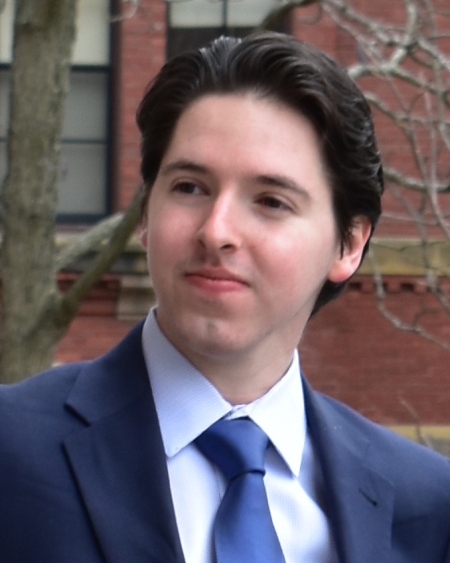On May 5, 2020, four students were named winners of the Visiting Committee Prize for Undergraduate Book Collecting.
Alan Tu ’23 was awarded first prize of $3,000 for his entry “Found in Translation: Contemporary World Fiction Revisited.” Daniel Sherman ’21 was awarded second prize of $1,500 for his entry “Unweeded: Guides to Villainous Vegetation.” And Perry Arrasmith ’20 and Pranati Parikh ’21 were co-awarded third prizes of $750 each for their entries “Paradise Sought and Collected: My Search for Hawai’i and Home” and “Learning a Life: Interacting with the Hindu Guru on the Shelf and in Practice,” respectively.
“One thing that was joyful about this year's winners was that they displayed the fantastic scale and scope of the worlds that books and ideas can bring to our lives,” said environmental research librarian George Clark, one of five judges who reviewed the submissions. “They ranged from the dynamically introspective in Pranati’s collecting on gurus, to the wildly international in Alan’s project on world fiction. Meanwhile, Daniel engaged a neglected niche of the biophysical environment with his work on weeds. And Perry explored cultural identity and citizenship in a multicultural state. I imagine the four of them talking together on a cross-country drive, and it’s an image of a complete liberal arts education contained in a Volkswagen.”
Established in 1977, the Visiting Committee Prize for Undergraduate Book Collecting is awarded annually to recognize and encourage book collecting by undergraduates at Harvard. It is sponsored by the Members of the Board of Overseers’ Committee to Visit the Harvard Library. Students competing for the book-collecting prize submit an annotated bibliography and an essay on their collecting efforts; the influence of mentors; the experience of searching for, organizing and caring for items; and the future direction of the collection. Entries are judged on the purpose, consistency, and quality of the collection and the presentation of the essay and bibliography, not the collection’s size, cost or rarity.
Sixteen students declared their intention to enter the competition, and six submitted their work for consideration. The judges this year were:
- George E. Clark, environmental research librarian, Services for Academic Programs
- Steven Riel, manager of serials cataloging, Harvard Library Information and Technical Services
- Lynn Sayers, administration and events coordinator, Maps and Media Services
- Martin Schreiner, director of Maps and Media Services
- Gretchen Wade, reference/collection development librarian, Botany Libraries

“Unweeded: Guides to Villainous Vegetation”
Daniel Sherman ’21
What is a weed? According to Emerson, it is “a plant whose virtues have not yet been discovered.” According to the character Eeyore from A. A. Milne’s immortal Winnie the Pooh, “Weeds are flowers too, once you get to know them.” Yet we think of weeds as the villains of the plant world. Really, weeds are weeds because they represent a failure of absolute control over our built environment.
My collection hopes to alter this paradigm of how we think about these ostracized plants. It includes 40 books on weeds, wildflowers, and other “noxious” plants. Mostly field guides, these books were published over a period of 120 years, from 1899 to the present. They explore two continents and thousands of species, all the while revealing a spectrum of biases for and against these plants.
The goal of this collection is to unveil the hidden beauty of society’s botanical rejects, their cultural histories, and their ecological functions from feeding pollinators to erosion control to reclamation of polluted land. As disruptors of the “concrete jungle,” weeds represent qualities we often want to see in ourselves: resilience, adaptability, strength, efficiency, ruggedness. Once you get to know them, as I have, perhaps that flower in a sidewalk crack or the dandelion in your lawn will not meet the usual scorn but rather acceptance and even appreciation.

“Paradise Sought and Collected: My Search for Hawai’i and Home”
Perry Arrasmith ’20
This collection represents my fascination with my home state of Hawai’i. It was not intentional, but continues to emerge as an active reflection of a journey to better understand the complicated socio-cultural, political, and economic forces which define the islands.
Homesickness played a role in the accumulation of some of these books. In my time at Harvard College, having the opportunity to read about Hawai’i in some way, shape, or form meant a lot to me. It would take me back home, even if only for a few moments.
Many of these books come from small local publishing houses and are intended for an island-wide audience, while others are meant for a popular national audience. In the future, I hope to apply this award towards expanding my collection of books on Hawai’i to those works covering the debate over statehood and the early years of statehood.

“Learning a Life: Interacting with the Hindu Guru on the Shelf and in Practice”
Pranati Parikh ’21
My family’s Hindu religious and cultural background has always inspired me to explore what the concept of a guru could mean to me. If not classical palm leaf manuscripts, isolated hermitages, and white-bearded sages, what might my own religion and relationship with the teacher hold, as an American young adult?
In my own childhood experiences at the Swaminarayan temple, the guru was a gleaming figure who represented paramount love and wisdom. But I did not know whether that love and wisdom could have anything real to do with my own life, which unfolded thousands of miles away and under the cultural rubrics of another hemisphere.
I began collecting — and more importantly, reading — books about Pramukh Swami, the guru of the BAPS Swaminarayan Hindu sect at the time, in order to negotiate my relationship both with the figure of the guru and with religion broadly. Why all the fuss over a single person, why these convictions? What kind of spiritual wisdom is actually relevant and livable, and can I access it through writings? Gathering and reading books became a rigorous and yet poignant study of the life of the guru, which helped me begin to answer these questions.
These books have become simultaneously portals into traditional realms I thought I could not enter and windows into myself. My experience with these books represents the kind of transparency and consistency between religious and cultural systems of thought that a diasporic faith demands.